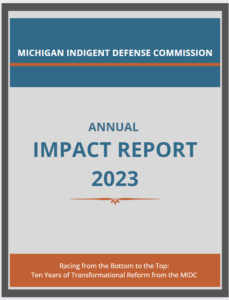Policies and Reports
The MIDC will periodically prepare and publish reports and analysis of indigent defense services and systems in Michigan. We are required by statute to publish on our website our policies, our budget and expenditures, and our annual report. M.C.L. §780.989(6), §780.999. The MIDC will publish reports of any data collected and analyzed pursuant to M.C.L. §780.989(1)(f) and M.C.L. §780.993(1).
The Michigan Indigent Defense Commission is required to publish its policies and make them available to all attorneys and professionals providing indigent criminal defense services, the Supreme Court, the Governor, the Senate Majority Leader, the Speaker of the House of Representatives, the Senate and House appropriations committees, and the Senate and House fiscal agencies. See MCL §780.989(h)(6). The current policies of the MIDC are described in the bylaws adopted by the Commission itself. The bylaws were adopted by the Commission in February 2015 and signed by the Chairperson. They provide as follows:
BYLAWS
ARTICLE I.
NAME, PURPOSE, AND POWERS
The Michigan Indigent Defense Commission is established by and derives its authority and responsibilities from Public Act 93 of 2013.
ARTICLE II.
MEMBERSHIP, APPOINTMENTS, RESIGNATION, AND TERMINATION
A. Membership. Commission membership shall be designated by the Governor. The Executive Director of the Commission may participate in Commission discussions but shall not have the power to vote on matters considered by the Commission.
B. Resignation. Resignations from the Commission shall be made to the Governor, in conformance with MCL § 780.987.
C. Removal. The Commission may recommend to the Governor removal of a Commission member from the Commission, in compliance with MCL § 780.987(8) and Article V. Section 10 of the Constitution of 1963.
ARTICLE III.
ELECTION OF OFFICERS, ORGANIZATION OF THE COMMISSION
A. Election of Officers and Organization of the Commission. The Commission shall annually elect, by a majority of those present, a Commission Chair, Vice Chair and Secretary. The Chair, Vice Chair and Secretary shall be eligible for reelection. The term of the Chair is limited to three consecutive years. The election shall be held at the regularly-scheduled Commission meeting in December, commencing in 2015. The term of office for the Chair, Vice Chair and Secretary shall comprise one calendar year, commencing on January 1st, and ending on December 31st, commencing January 1, 2015.
- Nominations. The Chair shall annually appoint an ad hoc nominations committee for the purpose of reviewing candidates for the office of Chair, Vice Chair and Secretary. At the regularly scheduled December meeting, the nominations committee Chairperson shall report out to the full Commission and submit nominations for each office. Following the report, the committee is discharged, and the floor shall be opened for additional nominations. Any committee member, or any Commissioner, may nominate a candidate for either office. No second is required to nominate a candidate. A vote shall be taken with new officers’ terms taking effect January 1 of the following year.
- Vacancies. A vacancy in the office of Chair, Vice Chair or Secretary is recognized upon resignation or removal as described in Article II of the Bylaws, or upon death. The Vice Chair is recognized as the presiding officer if the office of Chair is vacant. In the event both the offices of Chair and Vice Chair are vacant, the immediate past-Chair is recognized as the presiding officer. If the immediate past-Chair is not present, then the presiding officer shall be elected by majority vote of those present. Upon vacancy of the Chair, the presiding officer shall re-form the nominations committee, and if necessary appoint new members to the committee at the first regularly scheduled Commission meeting. Elections shall then be held in accordance with Article III of the Bylaws at the next regularly scheduled Commission meeting.
- Core Officer Duties. The Chair, Vice Chair and Secretary shall have the following core duties. The Executive Director shall assist with the coordination and implementation of such duties.
a. Chair:
1) Serve as presiding officer of Commission meetings;
2) Appoint standing committees;
3) Serve as a member of the Executive Committee, and as an ex-officio member of all other committees;
4) Coordinate preparation of Commission meeting agendas;
5) Provide formal reports, statements and testimony on behalf of the Commission;
6) Oversee and approve the Commission’s budget and expenditures;
7) Manage and evaluate the performance of the Executive Director;
8) Approve formal press releases and official public statements on behalf of the Commission;
9) Conduct such other duties as are reasonable and customary to fulfill the responsibilities of the Commission.
b. Vice Chair:
1) Perform the duties of the Chair when the Chair is unavailable to perform such duties.
2) At the Chair’s direction, conduct such other duties as are reasonable and customary to fulfill the responsibilities of the Commission.
c. Secretary:
1) Coordinate the issuance of Commission meeting notices;
2) Ensure that minutes of Commission meetings are recorded;
3) Coordinate press statements and other public communications made by the Commission;
4) At the Chair’s direction, conduct such other duties as are reasonable and customary to fulfill the responsibilities of the Commission.
B. Standing Committees. The Commission shall have the following standing committees, as well as additional standing committees appointed by the Chair and approved by the Commission from time to time, that shall not make decisions of the Commission or engage in deliberations as a quorum of the Commission. All committees may recommend to the Commission best practices in their subject areas and assist in the development of potential compliance plan models for approved standards subject to approval by the Commission.
- Executive Committee. The Executive Committee shall be a permanent committee consisting of the Chair, Vice Chair and Secretary. The immediate past Chair of the Commission shall be an ex officio and non-voting member of the committee provided the chair remains a member of the Commission. The Executive Committee may make recommendations to the full Commission on any business that may be considered by the Commission. The Executive Director shall be a permanent member of the Executive Committee, but shall not have the power to vote on matters considered by the Committee.
- Performance Standards Committee. This committee shall be responsible for overseeing the development of performance standards.
- Indigence & Compensation Standards Committee. This committee shall be responsible for overseeing the development of standards related to compensation and indigence.
- Training and Evaluation Standards Committee. This committee shall be responsible for overseeing the development of standards related to training and evaluation.
- Selection Standards Committee. This committee shall be responsible for overseeing the development of standards related to selection of attorneys.
C. Ad Hoc Committees. The Chair may establish ad hoc committees of Commission members that shall not make decisions of the Commission or engage in deliberations as a quorum of the Commission. Ad hoc committees shall perform specific tasks, and then, after making recommendations to the Commission, be dissolved.
ARTICLE IV.
MEETINGS, QUORUM REQUIREMENTS, AND PARLIAMENTARY PROCEDURES
A. Regular Meetings. The Commission shall meet no less than four times annually and shall, at its December meeting establish meeting dates for the ensuing year.
B. Special Meetings. The Chair may call a special meeting of the Commission upon determination that business of the Commission requires action prior to the next regularly scheduled meeting. The Chair shall call a special meeting upon the written request of five Commissioners. The agenda for a special meeting of the Commission shall be limited to the specific items for which the meeting was called. A special meeting may be conducted by polling commission members via e-mail.
C. Quorum. A quorum must be present in person, or via communication equipment to the extent permitted by law, for transaction of Commission business. The majority of the serving Commissioners shall constitute a quorum.
D. Presiding Officer. The Chair shall preside at all Commission meetings and perform functions delegated to the Chair by the Commission. In the absence of the Chair, the Vice Chair shall preside and perform functions delegated to the Chair. In the absence of both the Chair and Vice Chair, the immediate past-Chair shall preside and perform the functions delegated to the Chair. If the Chair, Vice Chair and immediate past-Chair are absent, the Commission shall appoint a temporary Chair who shall preside and perform functions delegated to the Chair only for that meeting or until the Chair or Vice Chair arrives.
E. Agenda for Regular Meetings. A proposed agenda of all known business to be conducted by the Commission shall be prepared for all regular meetings of the Commission. The Commission staff in consultation with the Chair shall prepare the agenda. The requirement for an agenda shall not interfere with the Commission’s responsibility to perform the functions specified in the statutes and executive orders in Article I of these Bylaws. The agenda for a regular meeting of the Commission shall include the following.
1 ) Call to Order.
2) Introduction of Commissioners and Guests.
3) Public Comments. Members of the public are provided the opportunity to make comment to the Commission. Public comment to the Commission shall be limited to 3 minutes per speaker and 45 minutes per meeting unless this requirement is waived by the Chair.
4) Additions to Agenda.
5) Approval of Minutes from the Previous Meeting.
6) Report of the Commission Chair, if any.
7) Report of the Executive Director. The Executive Director may deliver a report to the Commission.
8) Committee Reports, if any. Standing or ad hoc committees may deliver reports to the Commission.
9) Business Agenda.
A. Consent Agenda. The consent agenda shall consist of agenda items, which the Chair believes will not require extensive debate. Any Commissioner may request the removal of an item from the consent agenda, to the regular agenda.
B. New Business. The presiding officer opens discussion of new business, which appears on the agenda. Commissioners may raise additional items of new business within the scope of the Commission’s authority.
C. Unfinished Business. The presiding officer shall open discussion of unfinished business from previous meeting(s) which appear(s) on the agenda. Commissioners may raise items of unfinished business not raised by the presiding officer within the scope of the Commission’s authority.
10) Committee of the Whole. The presiding officer may entertain matters not otherwise on the agenda that the Commission wishes to discuss.
11) Announcement of Date, Time, and Location of Next Meeting.
12) Adjournment.
F. Agenda for Special Meeting. The agenda for a special meeting shall be limited to the items determined by the Chair or by the majority of the Commissioners serving.
G. Commissioner Attendance at Meetings. As soon as practicable, a Commissioner shall notify the Chair and/or Executive director of an intended absence.
H. Parliamentary Procedure. The presiding officer shall have the same voting rights as any Commissioners in all questions brought before the Commission, including elections. Any matter of meeting procedure not specified in these Bylaws shall be governed by the most recent version of Roberts Rules of Order, as practicable and as interpreted by the presiding officer.
ARTICLE V.
AMENDMENTS TO BYLAWS
A. Amendments. These bylaws may be amended by a majority vote of the Commission, provided the proposed amendment or amendments have been sent to each Commissioner prior to the meeting.
ARTICLE VI.
CONFLICTS OF INTEREST AND ETHICS
A. The Commission may adopt resolutions governing its interpretation of the term “actual expenses” as used in MCL §780.987(7).
B. A Commissioner shall abstain from voting on a question pertaining to funding for training the Commissioner will likely attend or participate in. Members may participate in discussion and debate concerning such questions.
C. A Commissioner shall abstain from voting on a question that concerns possible sanctions of that member or the agency that employs that member.
Modified the 17th day of April, 2018.
/s/ Michael Puerner, Chairperson

